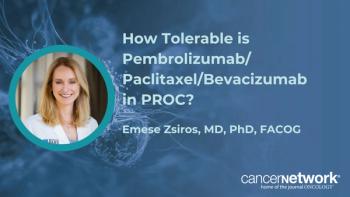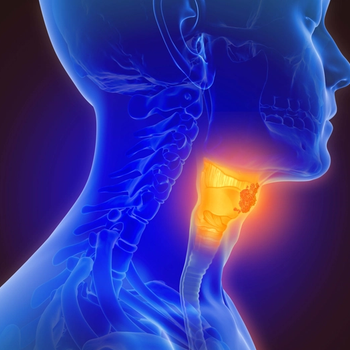
Diane Simeone, MD, Champions Early Detection of Pancreatic Cancer Through the PRECEDE Consortium
Diane Simeone, MD, spoke to the need to determine which patients are at risk of developing pancreatic cancer, the importance of early detection, and challenges that need to be addressed in order to improve survival.
In order to improve survival for patients with pancreatic cancer, developments need to be made in early detection, although progress has been slow due to a lack of unification; however, the creation of the Pancreatic Cancer Early Detection (PRECEDE) Consortium may help to help foster collaboration in the pancreatic space and possibly save lives, according to Diane Simeone, MD.
Simeone emphasized the need to accurately determine which patients are at increased risk of developing disease, whether the risk be hereditary or otherwise. The PRECEDE Consortium, which is assembling investigators, researchers, and cancer centers, seeks to address several unanswered questions: Who is most at risk? What does this risk look like? How can these challenges be addressed?
“With this effort, we've put a stake in the ground to say that our collective goal should be to get to a 50% survival [rate] for pancreatic cancer in 10 years,” Simeone explained. “I would like us collectively to think out loud about the strategy we're going to deploy to get to that.”
In an interview with CancerNetwork® during Pancreatic Cancer Awareness Month, Simeone, a professor of surgery, pathology director of the Pancreatic Cancer Center, and associate director of the Perlmutter Cancer Center at New York University Langone Health, discussed how a wider collaborative effort and sharing of data may pave the way to increased survival in pancreatic cancer.
CancerNetwork: What motivated you and your colleagues to pursue this research in this area of pancreatic cancer screening?
Simeone: I've been working in pancreatic cancer for quite a long time. I'm a surgeon, so I get to see the disease firsthand in patients. While from a surgical perspective we can do a lot of good for patients, what’s clear is that there are many patients who aren't candidates for surgical therapy. Even if they are candidates for surgical therapy, the tumors may be quite advanced. If we really want to be thoughtful about how we [push] the needle and improve survival for pancreatic cancer, it's clear that early detection is an important part of that. It's not that people haven't been trying to work on early detection; they have. But I think progress is in this area has been limited because the effort is not coordinated enough. There's not enough sharing of data, and it's not being done at the scale needed to really have an impact. Because of that, a couple years ago we came up with the idea to set about developing such a large scale, innovative, and coordinated path for early detection. That path is the creation of the PRECEDE Consortium. There, the goal is to assemble activities across numerous investigators, researchers, and pancreatic centers across the globe to be unified in an approach to tackle the 3 questions that we really don't fully understand the answers to: Who's at risk? What [is the] risk? What [are we] going to do about it? That's going to be significant in changing survival for pancreatic cancer.
Regarding effective screening, the research mentions the National Cancer Institute’s recommendations, which suggest screening should demonstrate the ability to detect early cancer, reduce cancer mortality, and have benefits that outweigh the risks. What role did these recommendations play in your work?
To tackle early detection and to develop a strategy that’s going to work, first we have to figure out who's at risk. One of the things we've tried to do is push for the identification of individuals who are in families with multiple members with pancreas cancer. We know through our work and the work of others that at least 10% of patients with pancreatic cancer actually carry a gene that put them at risk for [developing] pancreatic cancer. That's even absent of any family history of pancreas cancer. If we more fully test patients with pancreatic cancer, we're going to help them in their care because that may influence the therapy we give them and it's going to identify lots of people in families [who] need to be screened. Then, of course, hand-in-hand with figuring out who's at risk, you need to have early detection tests. That could be a blood-based test, that could be an imaging test, that could be something that's a conglomerate brought together using machine learning or artificial intelligence. But to validate anything for early detection, you must have a large cohort of individuals at elevated risk for pancreatic cancer. The cohort we've assembled is those with heritable risk, and we’ll soon be adding individuals with cystic tumors of the pancreas, which is also a pre-malignant condition.
What were some of the challenges you have encountered in proving the benefit of early screenings?
The thing that's clear is you need to have large enough numbers to prove screening saves lives. If you look at where we are with lung cancer, it really took a cohort of over 10,000 patients to result in the definitive paper that proved that screening saves lives. We didn't have any cohort that was close to that size. With PRECEDE and organizing centers together, we now have a roadmap to be able to enroll 10,000 high-risk individuals over the course of the next 5 years. With those 10,000 individuals, we're going to have comprehensive data collection, a biologic sample collected every year, and standardized imaging of the pancreas that will be obtained every year.
It provides an unparalleled dataset to get at this issue. It also allows us to bring sophisticated researchers who haven't worked on pancreatic cancer but have important expertise who have to be brought to the equation. We need to have better imaging than we have now. I always say that if we can land on Mars, we should be able to detect a small pancreatic cancer, we just haven't brought the right people to the table. By setting up this platform, now we're seeing that start to happen where we're having people come to the table to work on pancreatic cancer early detection who have not before.
Are there any other strategic steps that need to be taken to meet any of these outstanding challenges?
One of the key things, and it's not to be underplayed, is sharing of data. Academia doesn't necessarily reward sharing of data. Individual accomplishment is awarded. You have to set up a system where data sharing is required. In fact, you can't join PRECEDE unless you up front philosophically agree to share data. That's just a philosophical shift that needs to take place in our field. If you look at one of the most significant scientific advances we've had recently, which was the development of effective COVID vaccines in a record period of time, that really only happened because of the unprecedented worldwide emergency and everybody working together to share data. The same thing can happen for the early detection of pancreas cancer, but it has to be a different playing field.
Where should research be focused moving forward?
As we laid out in the commentary in Gastroenterology, for us to really change survival for pancreatic cancer, it's not going to happen by just the work at a few academic centers. It really has to be a change of philosophy much more broadly. We tried to broach that in this paper by saying no matter where you are, if you're seeing patients who fit this category, there are some basic standard things that should be uniformly done. There should be collection of a comprehensive family history for cancer. There should be standard high-quality imaging. There should be involvement at a center where there's a comprehensive screening program, so that data can be collected. It doesn't help us if people are scattered all over who are getting screened, but no data is collected. We can't change guidelines and can’t impact as many people positively as we want.
Pancreatic cancer has really been a recalcitrant cancer. It’s time for there to be a much larger effort, and the resources needed to do this need to be brought to the table. On the positive side, we have a very willing community of patients, clinicians, and researchers who want to make this happen. We're setting ourselves up for success, but everybody has got to roll their sleeves up to do the hard work needed in the next couple of years.
Reference
Gonda TA, Everett JN, Wallace M, Simeone DM. Recommendations for a more organized and effective approach to the early detection of pancreatic cancer from the PRECEDE (Pancreatic Cancer Early Detection) Consortium. Gastroenterology. 2021;161(6):1751-1757. doi:10.1053/j.gastro.2021.08.036
Newsletter
Stay up to date on recent advances in the multidisciplinary approach to cancer.










































